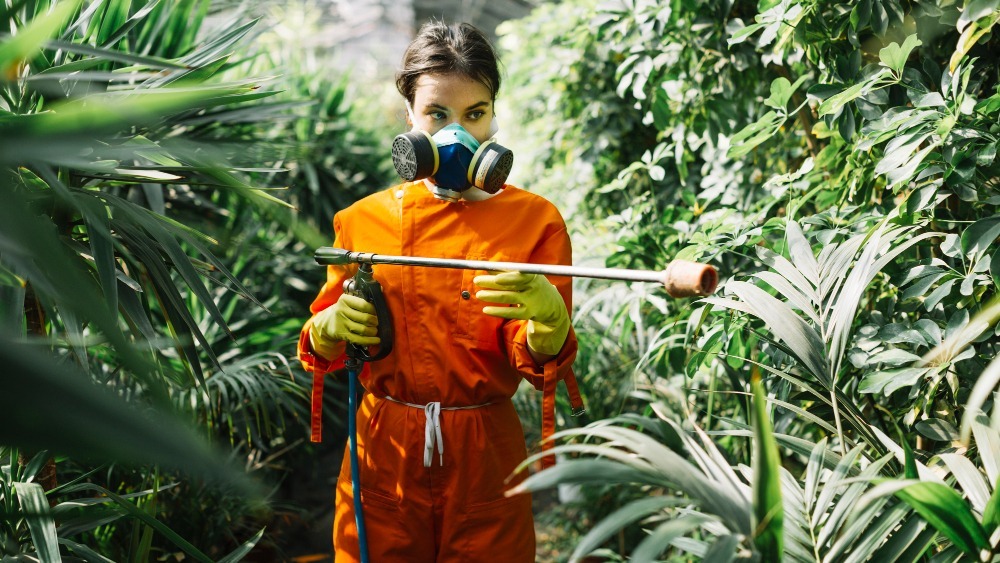Creating a thriving garden involves more than just planting seeds and watering plants. One of the key challenges gardeners face is controlling pests without resorting to harmful chemicals. Organic pest control methods provide a sustainable and eco-friendly solution, harnessing natural mechanisms to protect plants from pests while maintaining soil health and biodiversity. In this guide, we delve into secret weapon techniques for organic pest control, exploring effective strategies such as companion planting, biological controls, homemade organic sprays, and more. Discover how these methods can empower you to cultivate a robust garden that flourishes naturally.
Understanding Organic Pest Control: Effective Strategies for a Thriving Garden
Section 1: Understanding Organic Pest Control
What is Organic Pest Control?
Define organic pest control and its principles. Discuss why it’s beneficial for the environment and your health.
Benefits of Organic Pest Control
Explain the advantages such as reduced chemical exposure, healthier soil, and sustainable gardening practices.
Section 2: Common Garden Pests and Their Damage
Identifying Garden Pests
List and describe common pests encountered in gardens, such as aphids, caterpillars, and beetles. Explain the specific damage they cause to plants.
Section 3: Secret Weapon Techniques for Organic Pest Control
- Companion Planting
Definition and Concept
Explain how certain plants repel pests or attract beneficial insects. Provide examples like marigolds for nematode control and basil to repel mosquitoes.
Implementation Tips
Detail which plants to pair together and how to integrate companion planting into your garden layout.
- Natural Predators and Beneficial Insects
Introduction to Beneficial Insects
Discuss the role of ladybugs, lacewings, and predatory mites in controlling garden pests naturally.
Attracting and Protecting Them
Provide tips on attracting beneficial insects through plant selection and habitat creation.
- Homemade Organic Sprays and Solutions
Recipes and Applications
Share DIY recipes such as neem oil spray for aphids, garlic spray for caterpillars, and soap spray for spider mites.
Safe Application Methods
Guide readers on preparing and applying organic sprays effectively without harming beneficial insects or plants.
- Physical Barriers and Traps
Using Row Covers
Explain how row covers protect plants from pests while allowing sunlight and air to pass through.
DIY Traps
Detail traps like beer traps for slugs and sticky traps for flying insects.
- Soil Health and Plant Resilience
Importance of Healthy Soil
Discuss how nutrient-rich soil supports plant immunity against pests.
Composting Tips
Guide on composting to enhance soil fertility and resilience.
Section 4: Practical Tips for Implementation
Integrated Pest Management (IPM)
Explain the IPM approach combining various techniques for effective pest control.
Monitoring and Early Detection
Advise on regular inspections to detect pest issues early and take prompt action.
Seasonal Adjustments
Recommend adjusting pest control strategies based on seasonal pest behavior.
Section 5: Case Studies and Success Stories
Real-Life Examples
Share success stories from gardeners who have implemented organic pest control methods.
Results and Benefits
Highlight how their gardens flourished without chemical pesticides, emphasizing biodiversity and sustainability.
Section 6: FAQs on Organic Pest Control
Safety Concerns
Address concerns about the safety of organic pest control methods for pets and children.
Effectiveness
Discuss the effectiveness of organic methods compared to chemical pesticides.
Cost and Practicality
Explain the cost-effectiveness and practicality of implementing organic pest control in gardens of all sizes.
Here are some effective organic pest control methods
- Companion Planting: Certain plants repel pests or attract beneficial insects. For instance, marigolds deter nematodes, while herbs like basil and dill attract predatory insects.
- Beneficial Insects: Introducing beneficial insects like ladybugs, lacewings, and parasitic wasps can help control pest populations naturally.
- Neem Oil and Soap Sprays: Neem oil and insecticidal soaps disrupt pests’ feeding and reproduction cycles without harming beneficial insects.
- Physical Barriers: Using row covers, netting, or barriers like diatomaceous earth can physically block pests from reaching plants.
- Crop Rotation: Rotating crops each season helps disrupt pest life cycles and reduce pest buildup in the soil.
- Organic Pesticides: Homemade solutions like garlic-pepper spray or applying natural substances like kaolin clay can repel or kill pests.
- Maintaining Plant Health: Healthy plants are more resistant to pests. Ensure proper watering, spacing, and soil fertility to strengthen plant defenses.
- Handpicking: Removing pests by hand, especially larger ones like caterpillars or beetles, can effectively reduce populations.
- Trap Crops: Planting sacrificial crops that pests prefer can draw them away from main crops.
- Organic Fertilizers: Avoiding synthetic fertilizers can help maintain a balanced ecosystem, reducing susceptibility to pests.
FAQs
- What is organic pest control? Organic pest control involves using natural methods and products to manage pests in gardens without synthetic chemicals. It focuses on maintaining a balanced ecosystem to minimize pest damage.
- Why choose organic pest control over synthetic chemicals? Organic pest control is preferred for several reasons: it’s safer for beneficial insects, reduces chemical residues in food, supports biodiversity, and promotes long-term soil and plant health.
- Do organic pest control methods work as effectively as synthetic pesticides? Yes, organic pest control methods can be highly effective when properly implemented. They may require more frequent application or combinations of methods but can achieve comparable results without harming the environment.
- What are some examples of organic pest control methods? Common organic pest control methods include companion planting, beneficial insects, neem oil sprays, physical barriers, crop rotation, organic pesticides like insecticidal soaps, and maintaining plant health through proper watering and soil management.
- How do I prevent pests without harming beneficial insects? Organic pest control focuses on attracting or introducing beneficial insects that prey on pests. Using targeted treatments like neem oil or avoiding broad-spectrum pesticides helps preserve beneficial insects.
- Can I use organic pest control indoors? Yes, many organic methods are suitable for indoor gardening. For example, you can use insecticidal soap sprays or introduce beneficial insects in controlled environments to manage indoor pests.
- Are there any natural repellents for specific pests? Yes, certain plants like marigolds, basil, and garlic can repel specific pests. Additionally, homemade sprays using ingredients like garlic, pepper, or vinegar can deter pests effectively.
- How often should I apply organic pest control methods? The frequency of application depends on factors like pest pressure, weather conditions, and plant susceptibility. Regular monitoring and early intervention are key to successful pest management.
- Are organic pest control methods safe for pets and children? Generally, organic pest control methods pose fewer risks to pets and children compared to synthetic chemicals. However, it’s essential to follow product instructions and apply treatments during times when exposure risks are minimized.
- Can organic pest control methods be used in commercial farming? Yes, organic pest control methods are increasingly used in commercial farming, especially in organic and sustainable agriculture practices. They align with certification standards and consumer demand for chemical-free produce.
Conclusion
In conclusion, adopting organic pest control methods in gardening offers a sustainable and effective approach to managing pests while preserving the health of plants, soil, and beneficial insects. By integrating techniques such as companion planting, natural predators, and organic sprays, gardeners can minimize reliance on synthetic chemicals and promote a balanced ecosystem. This not only enhances plant resilience and yield but also contributes to environmental conservation and healthier produce. Embracing organic pest control aligns with the growing preference for sustainable practices in gardening, ensuring long-term benefits for both gardeners and the environment.

